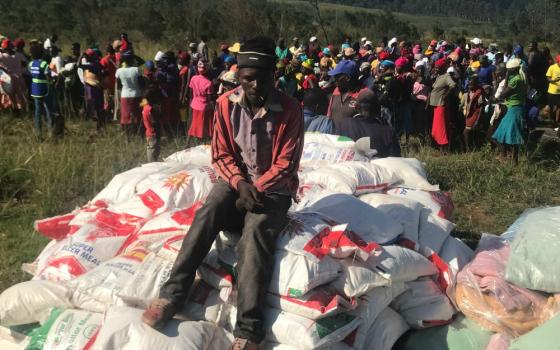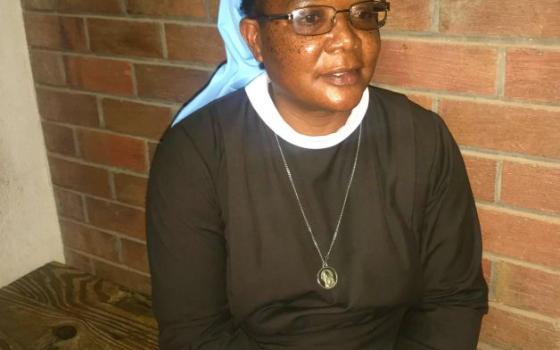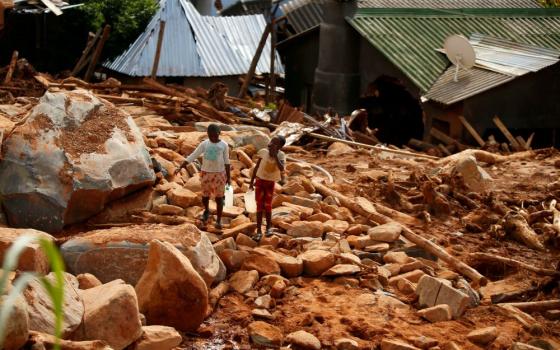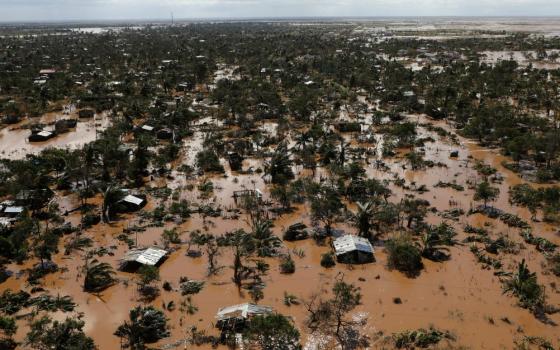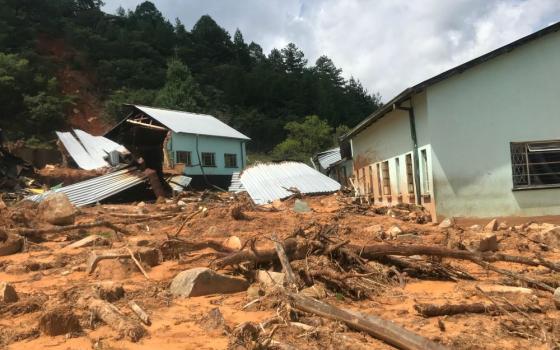In this remote district of eastern Zimbabwe, Sr. Marceline Mudambo of the Carmelite Nuns made her way first by SUV and then on foot through logs and big stones in muddy roads to help deliver food, water and basic health services to flood victims after strong winds and torrential rains hit the region in mid-March.
"We need to save the lives of these people," said Mudambo, who doubles as the social communications coordinator for Mutare Diocese in eastern Zimbabwe. "We urgently need enough food for the victims as current hunger mitigation efforts are inadequate."
Mudambo is among dozens of women religious who are helping vulnerable families affected by recent Cyclone Idai, which swept through parts of Mozambique, Malawi and Zimbabwe. The devastation is worse than initially assessed, according to humanitarian aid agencies. The estimated death toll among the three nations is about 750, though hundreds are still missing and the danger of more dying from disease is rising.
"We are providing food rations to one hundred families with an average of six people per family every month starting now in order to alleviate hunger," Mudambo said. "We are also providing an assortment of basic food items that would provide a balanced diet to the victims."
The worst of the flooding has been in Mozambique, with rivers curving downstream from neighboring countries. The port city of Beira, which connects landlocked Zambia, Zimbabwe and Malawi to the Indian Ocean, has been particularly hard-hit. Filipe Nyusi, president of Mozambique, called off rescue operations for victims after two-week long search, describing the deadly cyclone as the "worst humanitarian disaster in Mozambique."
"I want to thank the 945 rescuers who took part in the rescue operation," he told a news conference on Thursday. "We thank all of them. They are heroes."
Sr. Caroline Wazara, a Carmelite nun in Beira, Mozambique, who took part in the rescue operation, said thousands of people have now been affected by Cyclone Idai and worried that there would soon be an outbreak of water-borne diseases. "All drinking water was contaminated by raw sewage, dead bodies and animals that are yet to be retrieved from the area," said Wazara, who is also a nurse and originally from Zimbabwe. "There are already cases of cholera in Mozambique. We have brought in a team of nurses that is helping in the treatment of the survivors at makeshift clinics and those that are seriously ill would be referred to doctors helping in the area."
Apart from providing food supplies and healthcare, the Carmelite Nuns — a Zimbabwean order of Roman Catholic nuns — who are in the affected areas or traveling to the devastated communities to help — are also providing counseling services to the flood victims.
"Most of the cyclone survivors are traumatized," said Sr. Margaret Mubaiwa, a counselor. "They still do not know what happened to their loved ones who are still missing following the disaster. We are helping them recover."
The efforts by the nuns parceling out truckloads of food hampers to the flood victims have brought smiles to the faces of many of the people here who were left without any food, shelter and sources of income after floods ravaged through their district leaving a trail of destruction. The hampers contained corn meal, cooking oil, beans, sugar and salt.
"We had nothing eat in the past week until these Catholic sisters distributed some food rations," said Herbert Mabuka, 43, a father of five. "We were on the verge of starving to death."
Zimbabwe President Emmerson Mnangagwa told the affected communities recently that his administration was doing all it could to ensure that life returned to normal in areas affected by cyclone.
"My government has appealed to our friends in the international community and ordinary Zimbabweans to help us to feed our people who were affected [by Cyclone Idai]. We want to do everything we can so that children go back to their classes and people can go about their normal business," said Mnangagwa.
Many families from across the country in the path of the cyclone have been displaced, said Sr. Salome Mateko, a member of the Congregation of Jesus and national health coordinator for the Zimbabwe Catholic Bishops' Conference, in an email to GSR. About 5,000 homes have been destroyed and more than 50,000 people affected by flooding, she said.
"The emergency situation is of a scale which is clearly beyond current measures being deployed," she said. "The accumulated impact of the flooding has increased the vulnerability of the affected populations and communities, most of which were seriously affected by drought thus contributing to exhausting their coping mechanisms. Most of the affected people, in rural Chipinge and Chimanimani were already suffering from extreme poverty and deprivation before the disaster."
Catholic Relief Services says it is working closely with local agencies in Mozambique, Malawi and Zimbabwe to respond to the disaster. The agency's emergency and recovery efforts — based on initial assessments — will focus on providing assistance to 4,000 households in the three countries. Efforts will include providing food, shelter materials, hygiene supplies and water and sanitation, CRS said. Later work will include the repair and rebuilding of homes and helping affected farmers and merchants in urban areas rebuild incomes and livelihoods.
The storm worsened flooding that had already been an issue in affected regions, according to relief agencies. Thousands of people in the Mozambique provinces of Zambezia and Tete face ongoing challenges in the wake of floods that began in early March, as do numerous communities in eastern Zimbabwe and Malawi, CRS said in its summary.
Water levels in the Buzi and Pungwe river basins in Mozambique are continuing to rise, posing a risk for flooding in the urban areas of Beira and Dondo. The agency said that "access is a critical challenge," with many areas inaccessible due to damaged infrastructure. In Mozambique's Manica Province, for example, a bridge has reportedly collapsed, "isolating Dombe and Munhinga from the rest of the province," CRS said.
Earlier, Erica Dahl-Bredine, Catholic Relief Services' representative for Mozambique, told Catholic News Service that Beira, which is Mozambique's second largest city, "is almost completely destroyed, and some areas outside the city are impossible to reach."
Of the overall situation, Antonio Anosso, humanitarian officer for Caritas Mozambique, said those affected by flooding "have lost everything and those who were poorer are getting poorer."
Still, the sisters are helping where and how they can. Zimbabwe's Health Minister, Obadiah Moyo, commended the nuns' efforts, saying this would go a long way in alleviating hunger among communities.
"This gesture is an important effort that will help our government in dealing with hunger and nutritional challenges that are now affecting our people," he told GSR in an interview. "Our government, through the department of social welfare, wants to ensure that no one dies of hunger as a result of the natural disaster,"
The intervention by the Catholic nuns to provide food supplies to affected communities comes at a time when the main opposition Movement for Democratic Change (MDC-T) party is accusing the ruling party, in power for decades, of politicizing food aid.
"We have received reports that the ruling party is making sure that our supporters do not get access to the food aid," said Trevor Saruwaka, an official opposition spokesperson in Eastern Zimbabwe.
However, Mudambo said their activities were apolitical and were only centred on feeding the needy. "We are complementing the efforts being made by the government and other aid agencies," she said. "We are only playing our part in helping the vulnerable people."
[Frank Chikowore is an award-winning independent multimedia journalist based in Harare, Zimbabwe, who covers politics, business and other news in southern Africa. Doreen Ajiambo is a multimedia journalist based in Nairobi, Kenya. She is Africa/Middle East correspondent at Global Sisters Report. She covers religion, refugees and politics from Africa and beyond for various outlets in Europe. GSR International Correspondent Chris Herlinger contributed to this report.]
